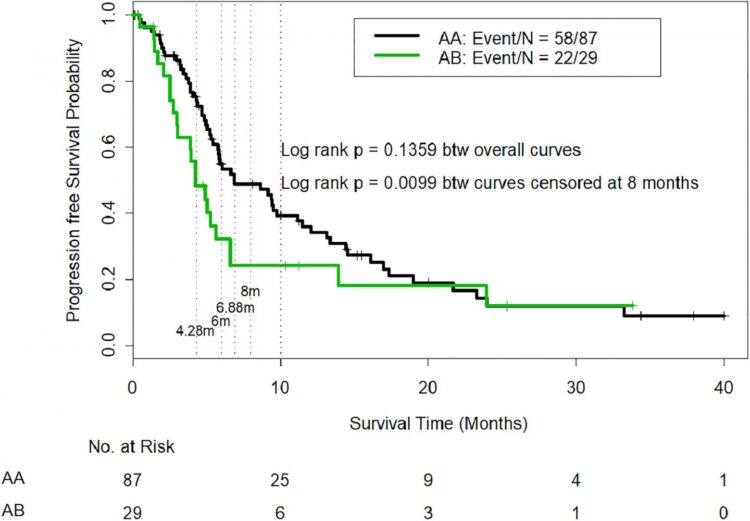In CTP class A patients, IGF/CTP score B was associated with shorter PFS and OS
Oncotarget published “Insulin-like growth factor 1/Child-Turcotte-Pugh composite score as a predictor of treatment outcomes in patients with advanced hepatocellular carcinoma treated with sorafenib” which reported that this study investigated the association of the IGF/CTP score with overall survival and progression-free survival of HCC patients treated with sorafenib.
The authors calculated the IGF/CTP score and used the Kaplan-Meier method and log-rank test to estimate and compare the time-to-event outcomes between patient subgroups.
171 patients were included, 116 of whom were CTP class A. Median PFS for IGF/CTP score AA and AB patients were 6.88 and 4.28 months, respectively.
Median OS for IGF/CTP score AA and AB patients were 14.54 and 7.60 months, respectively.
In CTP class A patients, IGF/CTP score B was associated with shorter PFS and OS, however, study was underpowered to reach statistical significance.
In CTP class A patients, IGF/CTP score B was associated with shorter PFS and OS
Dr. Ahmed O. Kaseb from The University of Texas MD Anderson Cancer Center said, “Accurate assessment of the functional hepatic reserve is important to the prognostic and treatment prediction for patients with liver disease.“
Several prospective and retrospective studies have confirmed that HCC patients in CTP classes B and C showed worse prognoses and accelerated decline in liver function as compared with CTP A patients.
However, it is known now that the clinical outcomes for patients can vary even within those in the same CTP class, including class A. In addition, subjective variables, ascites and encephalopathy of the CTP scoring system have been considered its major shortcoming because they are difficult to grade, vary daily, and could be affected by symptomatic management.
Subsequently, the authors prospectively validated a revised CTP scoring system by replacing the subjective clinical assessment of ascites and encephalopathy in the CTP score with objectively quantified plasma IGF-1 levels to create new IGF/CTP score classes.
In addition, these results showed that a significant number of patients in the old CTP class A were reassigned as IGF/CTP-B or -C and had significantly poorer survival than did those in IGF/CTP-A, proving the usefulness of the IGF/CTP composite score to refine the CTP scoring system’s prognostic accuracy.
Sorafenib, the first drug approved for the treatment of HCC, was approved after randomized, placebo-controlled trials demonstrated that it improved the overall survival of CTP class A patients with advanced HCC; the purpose of our current study was to investigate the usefulness of the IGF/CTP score in predicting overall survival and progression-free survival in CTP class A patients with advanced HCC who were treated with sorafenib.
The Kaseb Research Team concluded in their Oncotarget Research Output, “our results demonstrate that, in CTP class A patients with advanced HCC treated with sorafenib, the IGF/CTP scoring system provides more accurate associations with survival than the CTP score. This finding should be validated in studies with larger sample sizes. If our results are validated in independent future studies, our approach of computing CTP scores using IGF-1 levels and other laboratory-based parameters that are less subjective than the clinical assessments currently used may lead to a paradigm shift in predicting the efficacy and toxicity of systemic HCC therapies and in stratifying patients in HCC clinical trials. Our approach could also help differentiate between CTP class A patients who may benefit from active therapy and those in whom active therapy should be deferred to avoid unnecessary harm and save health care resources.“
###
DOI – https:/
Full text – https:/
Correspondence to – Ahmed O. Kaseb – [email protected]
Keywords –
IGF-1,
Child-Pugh,
sorafenib,
liver reserve,
hepatocellular carcinoma
About Oncotarget
Oncotarget is a bi-weekly, peer-reviewed, open access biomedical journal covering research on all aspects of oncology.
To learn more about Oncotarget, please visit https:/
SoundCloud – https:/
Facebook – https:/
Twitter – https:/
LinkedIn – https:/
Pinterest – https:/
Reddit – https:/
Oncotarget is published by Impact Journals, LLC please visit https:/
Media Contact
RYAN JAMES JESSUP
[email protected]
Original Source
https:/
Related Journal Article
http://dx.





